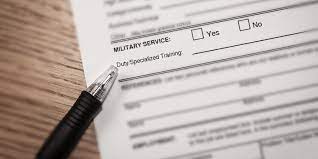When you’re going through the process for military verification service, it’s very important to keep your personal information safe. This service checks if someone has served in the military, which helps them get special benefits and support. But, while you’re sharing your details online or with different offices, you need to be careful. There are people and websites that might try to steal your information. Keeping your personal details secure means you can use these services without worrying about someone else using your information for the wrong reasons. In this guide, we’ll talk about why it’s important to protect your information and how you can do it. We want to make sure that you can get the benefits you deserve safely and easily.
Understanding the Risks
When you’re sharing your personal information for military verification service, there are some risks you should be aware of. Here are a few things to keep in mind:
- Identity Theft: If someone gets hold of your personal information, they could pretend to be you and do things like open bank accounts or apply for loans in your name.
- Fraudulent Activities: Scammers might use your information to trick you into giving them money or to access your accounts.
- Privacy Concerns: Your personal information is private, and you have the right to keep it that way. Sharing it without proper security measures could lead to your privacy being compromised.
Understanding these risks is the first step in protecting yourself and your personal information during the military verification process. By being cautious and taking the necessary precautions, you can reduce the chances of falling victim to identity theft or fraud.
Essential Documents for Verification
When undergoing military status verification, you’ll need certain documents to prove your identity and connection to the military. Here are the essential documents you should have ready:
- DD214 Form: This form serves as proof of military service and includes details like dates of service, discharge status, and awards received.
- Military ID Cards: These cards are issued to active-duty service members, veterans, and their dependents. They serve as official identification and may be required for verification purposes.
- Marriage or Birth Certificates: If you’re a dependent of a service member, you may need to provide marriage certificates or birth certificates to establish your relationship.
- Social Security Number: Your Social Security number is often used as a unique identifier during the verification process.
- Any Other Relevant Military Documents: Depending on your circumstances, you may need to provide additional documents such as orders, enlistment contracts, or separation papers.
It’s important to gather these documents before starting the verification process to ensure a smooth and efficient experience. Keep them organized and easily accessible, as you may need to provide copies or upload them online during the verification process. By having these essential documents ready, you can streamline the verification process and ensure accurate verification of your military status.
Secure Submission of Information
When submitting your personal information for military status verification, it’s crucial to prioritize security to protect yourself from potential risks like identity theft and fraud. Here are some tips for securely submitting your information:
- Use Official Websites: Always use official government websites or trusted platforms designated for military verification services. Avoid submitting your information through unfamiliar or unsecured websites to minimize the risk of data breaches.
- Verify Website Security: Look for indicators of website security, such as HTTPS encryption and a padlock icon in the browser’s address bar. These features ensure that your data is encrypted and protected during transmission.
- Avoid Public Wi-Fi: Avoid sharing sensitive information over public Wi-Fi networks, as they are vulnerable to hacking and interception. Opt for secure, private internet connections to protect your data instead.
- Protect Your Devices: Ensure that your devices, such as computers and smartphones, have up-to-date security software installed to prevent malware and unauthorized access to your information.
- Be Mindful of Phishing Attempts: Be careful when replying to emails or messages asking for personal information for military verification. Confirm the sender’s identity and refrain from clicking on any suspicious links or attachments that could be part of phishing scams.
- Limit Access to Information: Only provide the minimum required information for verification purposes and refrain from sharing unnecessary personal details. Be cautious when sharing information on social media platforms to prevent potential misuse by unauthorized individuals.
By following these precautions and prioritizing security when submitting your information for military verification, you can mitigate the risk of identity theft and fraud, ensuring a safe and secure verification process. Remember, protecting your personal information is essential to safeguarding your privacy and financial well-being.
Monitoring and Protecting Your Information Post-Submission
Once you’ve submitted your information for military status verification, it’s important to continue monitoring and protecting your personal data to prevent unauthorized access and potential misuse. Here are some steps you can take to safeguard your information:
- Regularly Check Your Accounts: Monitor your bank accounts, credit card statements, and other financial accounts regularly to detect any unauthorized transactions or suspicious activity. If you notice any discrepancies, promptly inform your financial institution.
- Monitor Your Credit Report: Request a free credit report from major credit bureaus at least once a year and review it for any unfamiliar accounts or inquiries. Monitoring your credit report can help you detect signs of identity theft early on.
- Stay Vigilant Against Scams: Be cautious of unsolicited emails, phone calls, or messages requesting personal information or claiming to be from government agencies. Verify the legitimacy of the sender before responding or providing any sensitive information.
- Update Your Security Settings: Frequently change your passwords and activate two-factor authentication whenever available to enhance security for your accounts. Employ robust, distinct passwords for each account to reduce the likelihood of unauthorized entry.
- Secure Your Devices: Ensure that your devices are protected with up-to-date antivirus software and security patches to prevent malware and data breaches. Avoid accessing sensitive information on unsecured networks or devices.
- Report Suspicious Activity: If you notice any unusual activity or believe your personal information has been compromised, report it to the appropriate authorities, such as the Federal Trade Commission (FTC) or your financial institution.
By staying vigilant and proactive in monitoring and protecting your information post-submission, you can minimize the risk of identity theft and fraud, ensuring your personal data remains secure. Remember, safeguarding your information is an ongoing process that requires continued attention and diligence.
What to Do if Your Information Is Compromised
If you suspect that your personal information has been compromised during the military status verification process, it’s essential to take immediate action to mitigate any potential damage. Here’s what you should do:
- Contact the Authorities: Report the incident to the appropriate authorities, such as the Federal Trade Commission (FTC) or your local law enforcement agency. They can provide guidance on steps to take and assist with investigating the breach.
- Notify Financial Institutions: Alert your bank, credit card companies, and other financial institutions about the potential compromise of your information. Request to freeze or monitor your accounts to prevent unauthorized transactions.
- Monitor Your Accounts: Monitor your bank statements, credit reports, and other financial accounts carefully for any indications of fraudulent activity. Promptly notify your financial institution of any suspicious transactions.
- Update Your Security Measures: Change your passwords for all online accounts and enable two-factor authentication where available. Consider implementing additional security measures, such as credit monitoring services, to protect against future breaches.
- Seek Legal Advice: If you believe you’ve suffered financial losses or damages as a result of the data breach, consider consulting with a legal professional to explore your options for recourse.
By taking prompt action and following these steps, you can help minimize the impact of a data breach and protect yourself from further harm. Remember, it’s essential to act quickly to address any security vulnerabilities and safeguard your personal information.
Conclusion
Protecting your personal information during military status verification is crucial for safeguarding your privacy and financial security. By understanding the risks, securely submitting your information, and remaining vigilant post-submission, you can minimize the likelihood of identity theft and fraud. Remember to monitor your accounts regularly, stay informed about potential scams, and take immediate action if you suspect any unauthorized access to your information. While data breaches can be concerning, taking proactive steps to protect your information can help mitigate the impact and ensure your personal data remains secure. By prioritizing security and staying vigilant, you can navigate the verification process with confidence and peace of mind.



